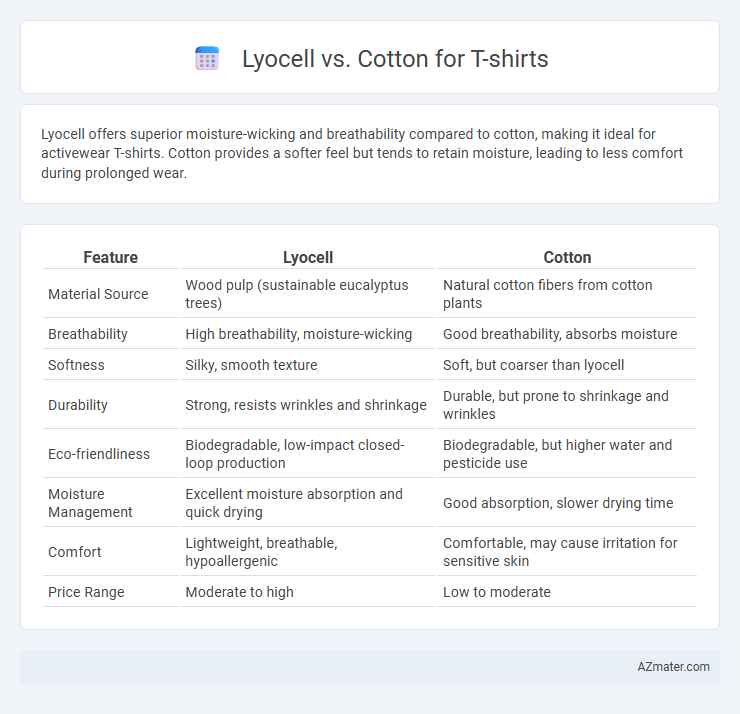Lyocell offers superior moisture-wicking and breathability compared to cotton, making it ideal for activewear T-shirts. Cotton provides a softer feel but tends to retain moisture, leading to less comfort during prolonged wear.
Table of Comparison
| Feature | Lyocell | Cotton |
|---|---|---|
| Material Source | Wood pulp (sustainable eucalyptus trees) | Natural cotton fibers from cotton plants |
| Breathability | High breathability, moisture-wicking | Good breathability, absorbs moisture |
| Softness | Silky, smooth texture | Soft, but coarser than lyocell |
| Durability | Strong, resists wrinkles and shrinkage | Durable, but prone to shrinkage and wrinkles |
| Eco-friendliness | Biodegradable, low-impact closed-loop production | Biodegradable, but higher water and pesticide use |
| Moisture Management | Excellent moisture absorption and quick drying | Good absorption, slower drying time |
| Comfort | Lightweight, breathable, hypoallergenic | Comfortable, may cause irritation for sensitive skin |
| Price Range | Moderate to high | Low to moderate |
Introduction to Lyocell and Cotton Fabrics
Lyocell is a sustainable fiber derived from wood pulp, known for its softness, breathability, and moisture-wicking properties, making it ideal for T-shirts. Cotton, a natural fiber from the cotton plant, offers durability, breathability, and comfort, widely used in T-shirt manufacturing for its versatility and affordability. Both fibers present unique benefits, with Lyocell standing out for eco-friendly production and cotton favored for its natural feel and widespread availability.
Overview of Lyocell: Origins and Production
Lyocell, a sustainable fabric derived from cellulose found in wood pulp, originated in the 1970s as an eco-friendly alternative to traditional fibers. Produced through a closed-loop process that recycles water and solvents, Lyocell minimizes environmental impact compared to cotton cultivation, which requires significant water and pesticide use. The fiber's smooth texture and breathability make it ideal for T-shirts, offering superior softness and moisture-wicking properties relative to conventional cotton.
Cotton: Traditional Staple in T-shirt Manufacturing
Cotton remains a traditional staple in T-shirt manufacturing due to its natural softness, breathability, and moisture absorption, making it ideal for everyday wear. Its widespread cultivation and processing infrastructure provide a cost-effective and widely available fabric choice compared to Lyocell, which is derived from sustainably sourced wood pulp through a closed-loop process. Despite the eco-friendly advantages of Lyocell, cotton's established durability and comfort keep it as the preferred material in the apparel industry, especially for casual T-shirts.
Environmental Impact: Lyocell vs Cotton
Lyocell production utilizes a closed-loop process that recycles water and solvents, significantly reducing environmental pollution compared to conventional cotton farming, which requires substantial water use and pesticides. Cotton cultivation accounts for approximately 16% of global insecticide demand, contributing to soil degradation and water contamination, whereas lyocell fibers are sourced from sustainably managed eucalyptus or other fast-growing trees. The biodegradable nature of both fibers offers end-of-life environmental benefits, but lyocell's lower resource consumption and eco-friendly manufacturing give it a superior environmental profile for T-shirt production.
Comfort and Feel: Which Fabric Is Softer?
Lyocell fibers are exceptionally smooth and moisture-wicking, providing a silky, breathable feel that enhances comfort for T-shirt wearers, especially in warm conditions. Cotton, particularly high-quality long-staple varieties like Pima or Egyptian cotton, offers a natural softness and plush texture that becomes even softer with washing. While cotton's softness is well-known, Lyocell generally delivers a silkier, cooler touch against the skin, making it the preferred choice for those prioritizing softness and moisture management in T-shirt fabrics.
Durability and Longevity Comparison
Lyocell fibers exhibit superior durability compared to cotton due to their strength and resistance to pilling, ensuring T-shirts maintain their shape and texture through frequent wear and washing. Cotton tends to weaken over time with repeated laundering, especially lower-grade varieties, resulting in fabric thinning and increased susceptibility to tears. The moisture-wicking properties and tensile strength of Lyocell contribute to a longer lifespan of T-shirts, making them a more resilient choice for extended use.
Moisture Management and Breathability
Lyocell fibers excel in moisture management by wicking sweat away from the skin, promoting quick evaporation and maintaining dryness during wear. Cotton, while breathable, tends to retain moisture, causing longer drying times and potential discomfort in humid conditions. The superior breathability and moisture-wicking properties of Lyocell make it an ideal choice for performance T-shirts and activewear.
Allergies and Skin Sensitivity Considerations
Lyocell fibers exhibit hypoallergenic properties, making them ideal for individuals with sensitive skin or allergies, as they resist bacteria and moisture absorption that can trigger irritation. Cotton, while breathable and soft, may harbor allergens and requires proper laundering to reduce potential irritants, which can be problematic for highly sensitive skin. Selecting Lyocell T-shirts can minimize allergic reactions and enhance comfort for those prone to skin sensitivities due to its smooth texture and moisture-wicking capabilities.
Cost and Affordability of Lyocell vs Cotton T-shirts
Lyocell T-shirts generally come at a higher price point compared to cotton due to the specialized closed-loop production process that makes Lyocell more sustainable but costlier. Cotton T-shirts, especially those made from conventional cotton, offer a more budget-friendly option with a wide range of prices catering to mass-market affordability. Consumers prioritizing cost-effectiveness often prefer cotton, while those willing to invest in eco-friendly and soft fabric favor Lyocell despite the premium price.
Which Fabric Should You Choose for T-shirts?
Lyocell offers superior moisture-wicking and breathability compared to cotton, making it ideal for activewear and hot climates. Cotton T-shirts provide natural softness and durability with easy care, suitable for everyday casual wear. Choose Lyocell for eco-friendly, high-performance comfort or cotton for classic, reliable fabric versatility.

Infographic: Lyocell vs Cotton for T-shirt
 azmater.com
azmater.com